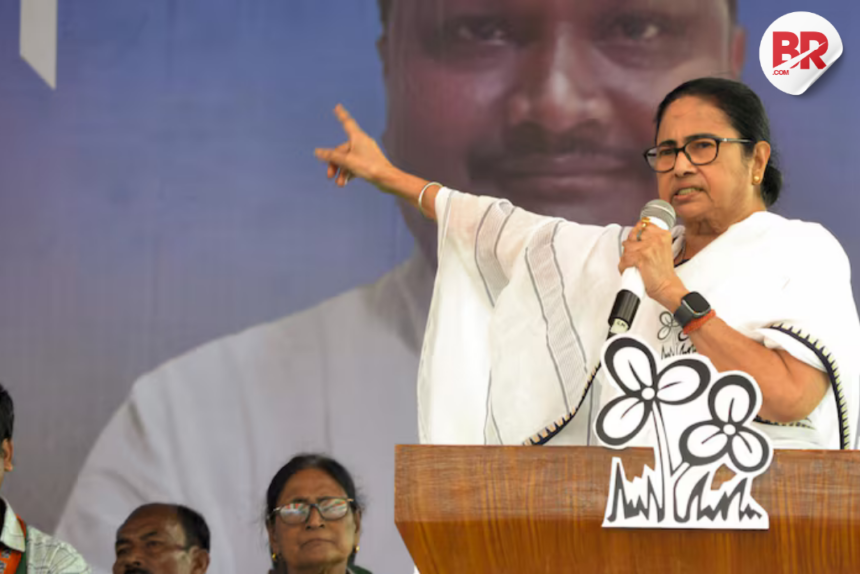Mamata Banerjee, the Chief Minister of West Bengal, is at the center of a political storm. Her bold accusations against Prime Minister Narendra Modi and the ruling BJP have sparked widespread debate.
Banerjee has raised questions about the BJP’s stance on Muslims, specifically criticizing their domestic policies and international relations.
The controversy centers around the Waqf Act and the BJP’s perceived hypocrisy when it comes to dealing with Muslim communities in India.
Mamata Banerjee’s Bold Claims
At the heart of Banerjee’s remarks is her accusation that the BJP’s actions contradict their international dealings. “You are against Muslims, but in Saudi…” she said, highlighting a perceived disconnect between the BJP’s actions towards Muslims in India and their friendly relationship with Saudi Arabia, a Muslim-majority country.
This statement has caught the attention of both political supporters and critics, further fueling the debate over the treatment of Muslims in India.
But Banerjee’s concerns don’t end there. She has also raised alarms over the Waqf Amendment Act, which governs the management of Muslim religious endowments. Banerjee argues that the amendments could undermine the autonomy of Muslim institutions, sparking fears among the Muslim community about the potential loss of control over these important religious assets.
Also Read: ‘We Won’t Allow It’: Mamata Blocks Waqf Act as Protests Turn Violent in Bengal
The Waqf Act: What’s All the Fuss About?
To understand the controversy surrounding the Waqf Act, we need to break it down. The Waqf Act regulates properties and institutions dedicated to religious or charitable purposes under Islamic law. These assets, known as Waqf properties, are vital to the Muslim community, as they are used to fund mosques, schools, hospitals, and other charitable organizations.
Banerjee’s opposition to the Waqf Amendment Act stems from concerns that it could lead to changes in the management of these properties.
The amendments could affect who controls these assets and whether they can be sold or repurposed. This has created anxiety within the Muslim community, as many fear that such changes could erode their ability to maintain these vital institutions.
Banerjee is rallying support from the opposition bloc, the INDIA alliance, urging them to unite against the amendments. She believes that a united front is essential to protect the rights of Muslim communities and preserve their religious and cultural heritage.
The Political Context
Mamata Banerjee’s accusations need to be seen in the larger political context of India. The country’s political landscape is deeply intertwined with issues of religion, caste, and regional identity. Banerjee, as a prominent opposition leader, has long criticized the BJP for its policies, particularly those perceived as discriminatory towards minorities.
By speaking out on issues like the Waqf Act, Banerjee is not just raising concerns about specific laws but is also positioning herself as a champion for Muslim rights in the face of the BJP’s policies.
Her comments aim to mobilize support among Muslim voters, especially in West Bengal, where the Muslim community makes up a significant portion of the population.
The BJP’s Response
From the BJP’s perspective, their policies are inclusive and designed to promote the overall development of all citizens. They argue that their diplomatic engagements with Muslim-majority countries like Saudi Arabia are necessary for strengthening bilateral relations and advancing India’s economic and political interests on the global stage.
However, Banerjee and other critics argue that the BJP’s actions at home don’t align with their international rhetoric.
The BJP’s critics believe the party is using its foreign policy to mask what they see as a more divisive domestic agenda, especially when it comes to Muslim rights.
Moving Forward: The Road Ahead
As the debate over the Waqf Act continues, Banerjee’s accusations will remain a key talking point in Indian politics. The larger issue of how the BJP handles its relationship with religious minorities, particularly Muslims, is unlikely to go away anytime soon. Citizens must stay informed, analyze different perspectives, and engage in constructive dialogue to create a more inclusive society.
In the coming months, expect to see more political volleys between Banerjee and the BJP. As the political drama unfolds, it’s clear that the stakes are high, and the future of the Waqf Act—and its impact on Muslim communities—will be a central issue.
Also Read: Supreme Court’s Crucial Waqf Case: Will the Interim Order Set a Landmark Precedent?




